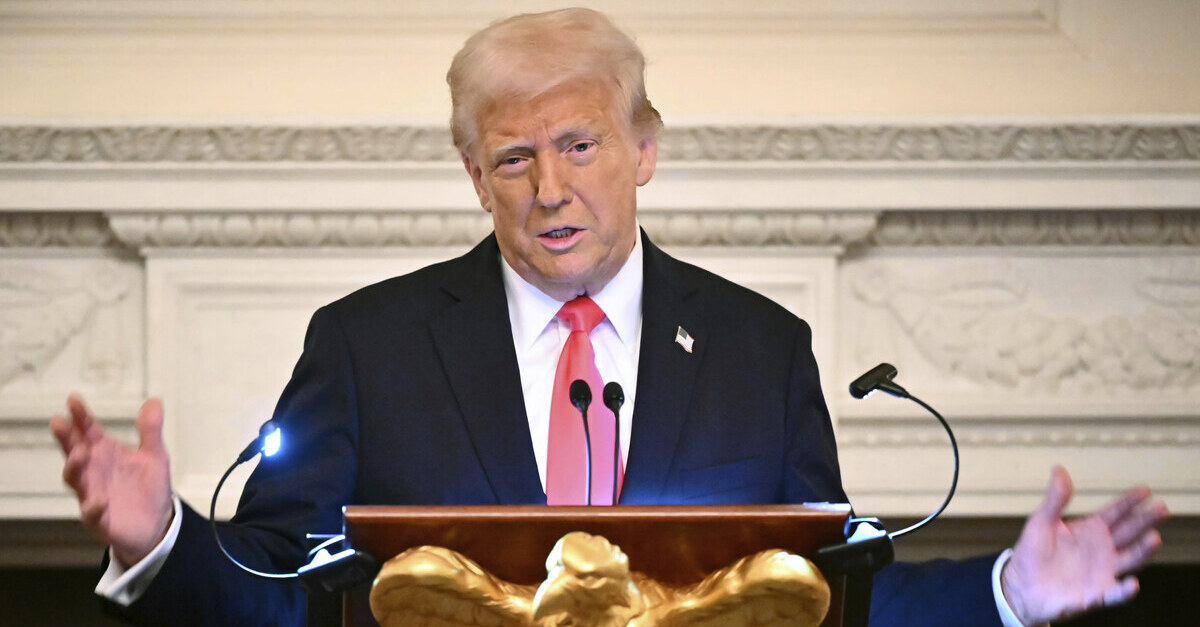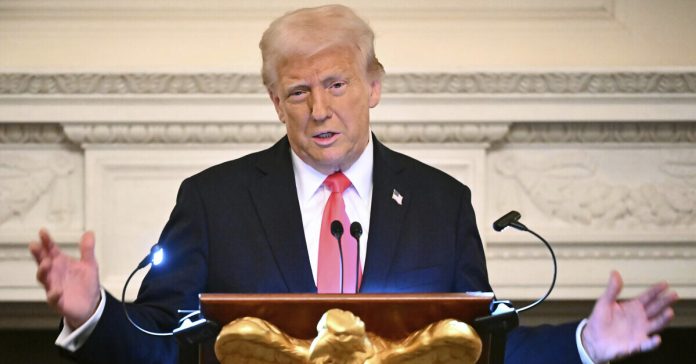
President Donald Trump gestures as he speaks during an Iftar dinner in the State Dining Room at the White House in Washington, Thursday, March 27, 2025 (Pool via AP).
The Trump administration wasted no time notifying a federal court in Manhattan that the government would be appealing a blockbuster ruling blocking many of the president’s international tariffs. Just hours after a three-judge panel on the U.S. Court of International Trade issued its unanimous order, attorneys with the Department of Justice requested that enforcement of the judgment be stayed until the case is heard by an appellate court.
The president’s unilaterally imposed tariffs, which went into effect on April 2, had been the centerpiece of the administration’s plan to pressure foreign nations into striking trade deals more beneficial to the United States. That strategy has now suffered a significant, albeit early, setback.
The administration asserted that “the Court erred” by interfering with Trump’s ability to conduct foreign affairs, arguing that halting the tariffs, even temporarily, could pose a grave risk to the state of international relations and U.S. national security.
“It is critical, for the country’s national security and the President’s conduct of ongoing, delicate diplomatic efforts, that the Court stay its judgment,” attorneys with the DOJ’s Civil Division wrote in the 17-page motion for a stay. “The harm to the conduct of foreign affairs from the relief ordered by the Court could not be greater.”
The motion quotes Secretary of State Marco Rubio as saying failure to stay the ruling would “cause significant and irreparable harm to U.S. foreign policy and national security” and “threaten broader U.S. strategic interests internationally.” It also quotes U.S. Secretary of Commerce Howard Lutnick claiming the ruling will create an ‘immediate risk” that America’s trading partners will “feel a renewed boldness to take advantage of” a perceived “new vulnerability by retaliating against the United States.”
The administration further argued that Trump’s “chosen means to deal with unusual and extraordinary threats” were not reviewable by the courts and are “immune from judicial scrutiny.”
The appeal, which will be brought before the U.S. Court of Appeals for the Federal Circuit, will likely make its way up to the U.S. Supreme Court, where the justices will be asked to weigh in on the president’s power to issue levies on imports from nearly every foreign nation without congressional approval.
Plaintiffs in the consolidated case, a coalition of Democratic states and several businesses, filed the suit last month alleging that Trump unlawfully and “arbitrarily” imposed the levies under an emergency statute in the absence of any actual emergency — an argument that parallels legal challenges to Trump’s invocation of an 18th-century wartime power to conduct mass deportations with little or no due process, despite the fact that the U.S. is not at war.
That statute, the International Emergency Economic Powers Act (IEEPA), grants the executive sweeping authority to quickly combat international economic crises and permits the executive to issue sanctions as a rapid response to emergencies. The question is whether Trump’s unilateral imposition of the tariffs constitutes an unlawful usurpation of the legislative branch’s control of the country’s purse strings.
The three-judge panel, which consisted of appointees from Presidents Ronald Reagan, Barack Obama, and Trump, on Wednesday reasoned that the tariffs “exceed any authority granted to the President by the IEEPA.”
“Because of the Constitution’s express allocation of the tariff power to Congress, we do not read IEEPA to delegate an unbounded tariff authority to the President,” the panel wrote. “We instead read IEEPA’s provisions to impose meaningful limits on any such authority it confers.”
The court also reasoned that Trump’s tariffs on Mexico, Canada, and China, which were imposed under the guise of combating fentanyl trafficking, fell outside the scope of the statute because they did not deal directly with the supposed national emergency. Instead, they were intended to apply economic pressure on those nations and force them to do more to combat the drug trade.
In addition to its appeal, the Trump administration also continued its practice of attacking judges who rule against its political agenda.
“It is not for unelected judges to decide how to properly address a national emergency,” White House spokesman Kush Desai said in a statement to NPR. “President Trump pledged to put America First, and the Administration is committed to using every lever of executive power to address this crisis and restore American Greatness.”

